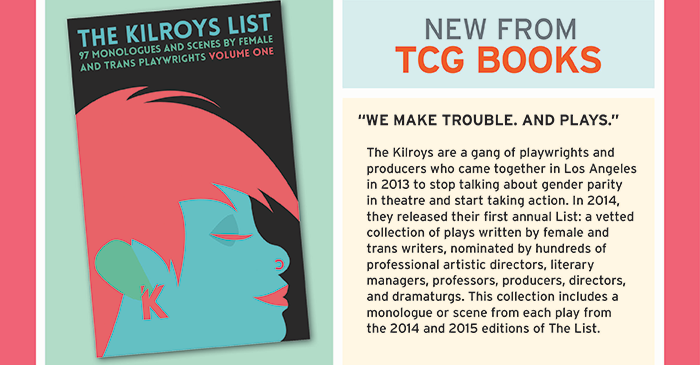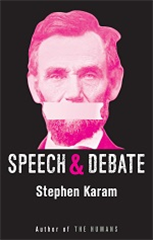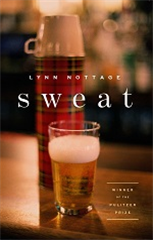- Book reviews by Kitty Drexel
On occasion, the New England Theatre Geek will review newly published plays. Below are reviews for Evan Hansen (the book), Speech & Debate, Sweat, and The Kilroys List… Volume One. All books are available via the TCG website.
Dear Evan Hansen
Book by Steven Levenson
Music and lyrics by Benj Pasek & Justin Paul
Theatre Communications Group
New York, 2017
$15.95
This version of the libretto and book is wrapped in the DEH blue cover with boy in a cast. After the acknowledgements but before the production history, James Lapine has written a thoughtful foreword. Bios for the creators are located in the back of the book. Please note that this book does not include the musical score. DEH sheet music can be purchased at your favorite bookseller or borrowed from the local library branch for free.
Dear Evan Hansen won nine 2017 Tony awards including Best Musical, Best Score and Best Actor in a Musical (awarded to Ben Platt). It follows Evan Hansen, a teenager with severe social anxiety and deep insecurities, as he inserts himself into the personal tragedies of the Murphy family. Connor Murphy committed suicide. Evan pretends that they were good friends because Connor’s family needed a lie to believe in. DEH is about how we misunderstand crippling mental illness.
Pasek, Paul and Levenson have written a beautifully sympathetic musical. The book and lyrics alone are a useful tool to examine the many layers that went into this production. Unfortunately, the creators and TCG missed a plum opportunity to aid their theatre community. Nowhere in its pages do they list mental health resources for their readers. Not doing so, whether purposefully or accidentally, insinuates to the reader that the publishers have only a superficial (monetary) interest in this work.
Speech and Debate
By Stephen Karam
Theatre Communications Group
New York, 2017
$14.95
From the TCG website: “In this unconventional dark comedy, three misfit high school students in Salem, Oregon form a unique debate club, complete with a musical version of The Crucible (on a rockin’ Casio keyboard), an unusual podcast, and a plot to take down their corrupt drama teacher. With his signature wit, Karam traces the cohort’s attempts to fend off the menace of encroaching adulthood with caustic humor and subversive antics.”
More than just a play about high school outcasts, Karam attacks with humor and sensitivity the challenges adolescents face coming of age with uncapped internet privileges. All three manipulate gossip for personal gain. They become “friends” accidentally while parents aren’t paying attention.
The role of Diwata is an excellent opportunity for the right POC actress to brandish her inner theatre geek. There’s a bit of singing, and a lot of melodrama required in this part. The role of Teacher/Reporter should be filled by an actress with some flexibility. Solomon and Howie could be played by any race.
The scenes are structured by a Debate tournament. There is no intermission. Boston’s Bad Habit Productions (RIP) performed Speech and Debate in 2016 as part of their ninth season. It was a rousing production. So much so that it makes me nostalgic for their interpretations of other contemporary plays. This edition brings those memories back.
Bonus nugget: Solomon takes a jab at Mike Pence. It’s cute.
Stephen Karam’s plays include The Humans (Tony Award and Pulitzer Prize finalist), Sons of the Prophet (Pulitzer Prize finalist), and Speech & Debate. His adaptation of The Cherry Orchard premiered on Broadway for the Roundabout Theatre Company
Sweat
By Lynn Nottage
Winner of the 2017 Pulitzer Prize for Drama
Theatre Communications Group
New York, 2017
$14.94 paperback
$28.00 hardcover
Nominee for 3 Tony Awards including Best Play; Winner of the Pulitzer Prize for Drama.
As long as the income divide is as great as it is, as long as whiteness is supreme, those that aren’t that will suffer. Sweat is about how the income secure (i.e. rich) convince the white income insecure that the marginalized income insecure are trying to take away their money. The factory workers of Reading, PA are being forced out of their jobs by greedy businessmen. Within the union, workers are pointing fingers. Tracy (white) is convinced new supervisor/ex-best friend Cynthia (black) is holding out of the workers on the floor. Young men Jason (white) and Chris (Black) are convinced that scabs like Oscar (Hispanic) are stealing their jobs. Strikers frustrated for answers are pointing fingers everywhere except at the culprits: union busting Owners. With limited resources and nothing but time, the workers get violent.
Nottage is a writer for our times. She teaches her audience the dangers of race equality of convenience (equality that disappears when things get inconvenient for it to exist), with the swiftness of a saw blade through butter. She doesn’t mince allegories; the American racial caste system is immediately apparent. Sweat difficult to read because its truths are so omnipresent in society. It’s the kind of play that will teach new evils to an already woke cast.
I took several deep breaths after finishing this script. Then I took several more. This could have happened in my home town. Who knows? It probably has. One can only imagine the power a live performance would hold.
Lynn Nottage is the recipient of two Pulitzer Prize Awards for Drama for Sweat and Ruined. She is the first woman playwright to be honored twice. Her other plays include Intimate Apparel; By the Way, Meet Vera Stark; Fabulation, or the Re-Education of Undine; Crumbs from the Table of Joy; and Las Meninas.

The Kilroys List: 97 Monlogues and Scenes by Female and Trans Playwrights, Volume One
By The Kilroys
Theatre Communications Group
New York, 2017
$16.96
From the TCG website: “Theatre Communications Group (TCG) is pleased to announce the publication of The Kilroys List: 97 Monologues and Scenes by Female and Trans Playwrights, Volume One. The Kilroys are a gang of playwrights and producers who came together in Los Angeles in 2013 to stop talking about gender parity in theatre and start taking action. In 2014, they released their first annual List: a vetted collection of plays written by female and trans writers, nominated by hundreds of professional artistic directors, literary managers, professors, producers, directors, and dramaturgs. This collection includes a monologue or scene from each play from the 2014 and 2015 editions of The List.”
Paula Vogel advises in her forward that playwrights should not “wait for permission to be produced(.)” She speaks as a playwright and an activist. It is a motivating essay to all readers. The female identified, willing and able should run towards that which empowers them to make theatre.
After Vogel’s forward is a brief bio of The Kilroys. They “make trouble. And plays.” That’s a worthy mission if there ever was one.
The book is organized first by playwright and then by play. At the end of the volume, there are 32 pages of playwright biographies. Producers unimpressed with the multitudes of options covered by the monologues can research other play options there.
This very special compilation of monologues for women and men is a treasure trove of new works for every age, race, gender identity, and theatrical preference. One should not mistakenly assume that this book is for female performers only. Feminism and its art is for all. And, it’s not just a book of audition material, The Kilroys List is a large list of ready to perform works by living playwrights. It is a valuable resource for theatres wishing to perform more new works.
Not all of the monologues pass the Bechdel test. There are quite a few for men, women, trans identified, and people of color that do.
Queen’s Note:
We elected a thin-skinned Nazi to the office of the President who is turning our “democracy” into a fascist, totalitarian oligarchy dominated by the 1%. Trump is a monster. His policies, when he names them, are destructive. His narcissistic behavior is more so.
Congressional “negotiators” released a spending bill that saves the National Endowment for the Arts, the National Endowment for Humanities, and National Public Radio until September at which time, the President and his impotent cronies may still cut arts funding. It is ever important to remain vigilant. And, for the love of all that’s sacred, keep creating. If you need help, ask for it. Our existence is our resistance. May the force be with you. – KD
USDAC has a downloadable guide on resistance through art.



